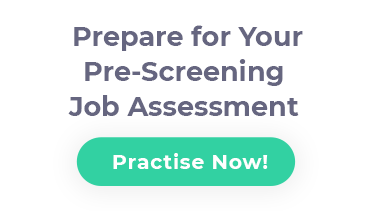How to Prepare for Job Interviews? – 2025

What Is an Online Interview?
Some companies’ hiring processes will require a candidate to complete an online interview before asking them to schedule an in-person interview. Online interviews can also be referred to as video interviews, and they are generally conducted in one of two ways: a live interview over the webcam or a self-recorded video of the applicant submitted through a platform like HireVue. The questions in these interviews will primarily regard a candidate’s behaviour, attitude toward their work and colleagues, and a self-assessment of their strengths and weaknesses. These interviews are not only an opportunity for applicants to showcase their skills and experience, but they are also an excellent way to demonstrate a desire for personal and professional growth.
How to Prepare for an Online Interview?
As with any interview scenario, candidates should set aside time before their interview to prepare answers for possible interview questions. Candidates should begin by looking over possible interview questions (provided below), then list out the key points they want to include in their answer. Whenever possible, answers should include specific examples of scenarios in which the candidate demonstrated the skills or traits being discussed. An excellent technique to keep in mind while formulating answers is the STAR technique. This stands for Situation, Task, Action, and Result. Following this format guarantees that an applicant will provide a specific and detailed answer, while keeping their answer concise.
Once an applicant has developed their answer to several possible interview questions, it is a good idea for them to participate in a few rounds of mock interviews. The best way to practice answering interview questions is to replicate the conditions under which the interview will take place, then ask a friend or family member to role play as the interviewer. (If it is not possible to set up a mock interview with a friend or family member, candidates can practice delivering their answers to themselves in a mirror.) This will give the candidate an opportunity to get a feel for what the actual interview process will be like, as well as to get a better idea of how to deliver their answers concisely. While applicants should practice delivering these answers several times, it is best to set a limit of roughly 3-4 rounds. This way, their answers will not sound over-rehearsed during the actual interview.
How to Maintain a Professional Atmosphere in an Online Interview?
Due to the fact that online interviews are done via webcam, candidates have a great deal of freedom to choose where (and sometimes when) they complete these interviews. Applicants should complete their interview in a location where they have access to good lighting and a good internet connection. The interview environment should be quiet and have a clean, professional appearance. Make sure this area is free from any potential distractions.
It is also important that the applicant present themselves professionally during this interview. This means ensuring they have enough time before their interview to choose a clean-cut outfit and complete any hair and make-up routines. In most cases, it is best to dress conservatively, avoiding outlandish patterns, loud colours, and gaudy jewellery.
After preparing the interview space and making sure their appearance is professional, interviewees should take a few moments to review their resume. Recruiters often refer to specific details from an applicant’s resume during an interview, so a quick review can help interviewees get a clear idea of what might come up during the interview.
Types of Questions in an Online Interview?
As previously mentioned, online interviews focus mainly on an applicant’s professional behaviours and attitudes, as well as their assessment of their own areas of strength and areas of weakness. Below is a brief explanation of the three main types of questions applicants will encounter during an online interview and a few example questions of each type.
Behavioural Questions
Behavioural questions aim to give the interviewer a clear picture of your approach to work, interactions with colleagues, and interactions with clients and customers. Generally, these questions will ask you to describe a time in which you used a specific skill or performed a certain task. Interviewers want to see through your answers that you can handle conflict and resolve problems constructively. The key to answering these questions well is to follow the STAR technique outlined above. Some behavioural questions you may be asked to answer are:
- How do you handle meeting a tight deadline?
- Have you ever handled a difficult situation with a supervisor? Explain how you dealt with this situation.
- Describe a time where you had to work within a team. How did you handle this situation?
- What kinds of people do you work least well with? How do you handle working with these people?
- Describe a time when you went above and beyond what was required of you.
Ethical/Moral Questions
Ethical questions are designed to help recruiters determine how you would handle difficult, sometimes morally ambiguous situations. This allows them to get a better idea of how well you would fit into their company culture. Be sure that before your interview, you have researched the company’s values to not only ensure that you will be comfortable working in that environment, but also to give you a better idea of how to answer these questions. Again, when possible, use the STAR technique to answer these questions with specific examples. Ethical questions you are asked may include:
- If you were in a situation where a coworker was doing something illegal or against company policy, what would you do?
- Describe a time where you were asked to do something unethical. How did you handle this situation, and what did you learn from it?
- Would you be willing to lie to a friend or colleague to make a sale?
- When you have an ethical issue arise at work, who do you consult?
Self-Assessment Questions
Self-assessment interview questions are intended to reveal how self-aware you are of your own professional strengths and weaknesses, and how dedicated you are to your own personal and professional growth. Recruiters want to see that you take initiative to learn from past mistakes and grow into new skills and new roles. Remember that employers view hiring not only as a necessity, but as an investment. These questions help them to determine how profitable you would be as a long-term investment if they hire you. Before answering these questions, you may find it helpful to solicit feedback from current or former coworkers or employers. They can help you to develop a fuller understanding of areas in which you are already successful and areas in which you have room to grow. Be sure to make it clear through specific examples that you are taking initiative to strengthen your areas of weakness. Again, use the STAR technique when answering self-assessment questions such as:
- What are your three main weaknesses?
- What gives you mental satisfaction?
- What is your management style?
- What is your greatest strength?
- How do you deal with things that annoy you?

